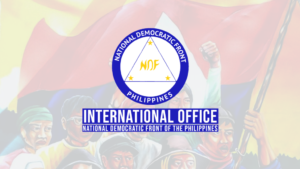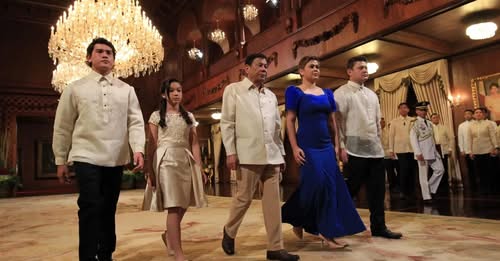The National Democratic Front of the Philippines (NDFP) celebrated its 52nd anniversary on April 24, 2025 by vowing to establish more revolutionary organizations in addition to the 18 of its affiliates, expand the mass base for the armed struggle and create more organs of political power across the entire archipelago as the Marcos Jr. administration vows to cripple the revolutionary movement.
Established under the very nose of the Marcos Sr. fascist dictatorship in 1973, the NDFP has expanded its membership nationwide and organized Filipino communities overseas to advance the national democratic revolution. In a statement, NDFP Secretary General Elias Dipasupil said the NDFP “salutes all the heroes and martyrs whose lives were offered to plant the seeds of a new people’s democratic republic by waging the national democratic revolution led by the Communist Party of the Philippines (CPP) and its army, the New People’s Army (NPA.) This is also an occasion to recognize the steady gains of the rectification movement since it was launched in 2023 to advance the national democratic revolution amid the US-Marcos Jr regime’s brutal enemy attacks and treachery and chicanery. No amount of fascist attacks and deceit (such as the endless offer of amnesty) against the revolutionary movement can deter the resolve of the revolutionaries and the Red fighters to rectify weaknesses and errors and carry forward the revolution to victory and end the sufferings of the Filipino people.”
Dipasupil said the celebration comes amid the noise of the 2025 midterm elections, dominated by the narrative of the ruling classes and political dynasties. The bankruptcy, rottenness and outright irrelevance of the bogus platforms and empty promises dished out by bourgeois candidates “only proves the necessity, the justness, and the urgency to push forward the national democratic revolution and to highlight the NDFP’s 12-point program as the solution to the chronic crisis of the semicolonial and semifeudal system that no reactionary elections could ever resolve.” The NDFP 12-point program offers hope for the Filipino people. Currently, it is being fleshed out by the revolutionary mass organizations and organs of political power in the countryside serving as the basis of unity and framework of struggle of the various patriotic and democratic classes of workers, peasants, the semiproletariat, the petty-bourgeoisie and national bourgeoisie.
While recognizing the importance of other forms of struggle, Dipasupil said, NDFP upholds the primacy of armed struggle to dismantle the rotten semicolonial and semifeudal system while gradually and steadily creating the new system through the development of the revolutionary organs of power in the countryside. “We build a future that is bright as we destroy the decayed and corrupt system,” he added. The NDFP did not only provide political, material, and technical support to the NPA but have deployed Red fighters, some of whom became commanders. The NPA carries out the armed struggle and implements agrarian revolution and mass base building towards establishing organs of political power that are the seeds of the people’s democratic republic.
While still in struggle, Dipasupil explained, these organs of political power already flesh out and execute, in various levels, components of the NDFP 12-point program such as the minimum program for land reform, education and health services, environmental protection, justice system, among others. These organs of political power are represented by the NDFP in establishing proto-diplomatic relations with states and other international agencies and in peace negotiations with the reactionary government of the Republic of the Philippines. The NDFP must establish, expand, and strengthen the revolutionary mass organizations both in the cities and in the countryside. With the current global and national crisis, the mass organizations are indispensable in the Filipino people’s fight against oppression and exploitation and in building a society they so deserve, one that serves their interests.
On the same day, the International Office of the NDFP said “amid intensifying global and domestic crises, imperialist powers are increasingly locked in sharpening inter-imperialist rivalry and are unleashing ever more aggressive economic, political, and military interventions to preserve their declining hegemony. From Eastern Europe to West Asia, to the South China Sea, the threats of fascism and imperialist-instigated wars loom large. The crisis of the global capitalist system continues to deepen, pushing more countries into debt, austerity, and dependency.” Long mired in the shackles of semicolonial and semifeudal rule, stands most vulnerable to these convulsions. Under the Marcos Jr. regime, foreign domination has only worsened. Our lands, labor, and sovereignty are auctioned off to imperialist powers through military agreements, neoliberal economic policies, and the violent repression of resistance. The aggressive US military presence in the archipelago under so-called EDCA (Enhanced Defense Cooperation Agreement) sites, the Balikatan exercises, and the deepening exploitation of Filipino migrant labor, reflect the regime’s betrayal of national interest and its subservience to imperialist dictates.
“Yet the crisis reveals not only the decaying foundations of the ruling system—it also sharpens the Filipino people’s will to resist. The semicolonial and semifeudal conditions in the Philippines are not mere historical residues—they are the very foundation of the deepening crisis that has condemned generations of Filipinos to poverty, repression, and forced migration. These structural roots of suffering cannot be solved by reforms under the current ruling system, which only serves to reinforce imperialist plunder, bureaucrat capitalist greed, and feudal exploitation. Armed resistance, through protracted people’s war, is not only just but necessary. It is the only path to dismantle the state machinery that defends foreign domination and class oppression. It is the only road toward asserting national sovereignty and achieving genuine democracy,” the NDFP International Office argued.
In conclusion, the NDFP called on its 18 allied organizations to wage a campaign to promote the NDFP’s 12-point program, comprised of the following: 1. Unite the people for the overthrow of the semicolonial and semifeudal system through a people’s war and for the completion of the national democratic revolution; 2. Establish a People’s Democratic Republic and a democratic coalition government; 3. Build the people‘s army and a people’s defense system; 4. Uphold and promote the people’s democratic rights; 5. Terminate all unequal relations with the US and other foreign entities; 6. Implement genuine agrarian reform, promote agricultural cooperation, raise rural production and employment through modernization of agriculture and rural industrialization and ensure agricultural sustainability; 7. Break the US–big comprador–landlord dominance over the economy, carry out national industrialization and build an independent and self-reliant economy; 8. Adopt a comprehensive and progressive social policy; 9. Promote a national and progressive people’s culture; 10. Uphold the rights of the Bangsa Moro and the Cordillera peoples and other indigenous peoples to self-determination and democracy; 11. Advance the revolutionary emancipation of women in all spheres, and; 12. Adopt an active, independent and peaceful foreign policy. (DIEGO MORRA)




